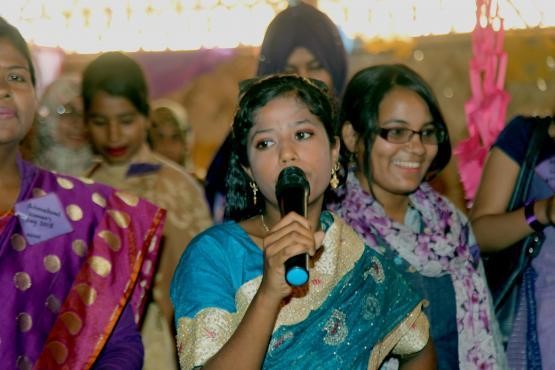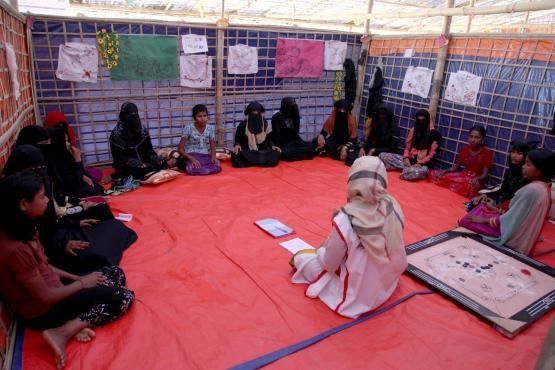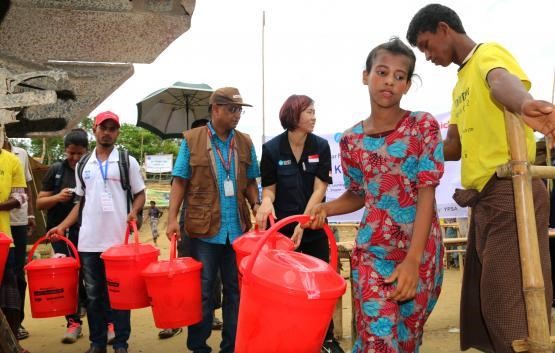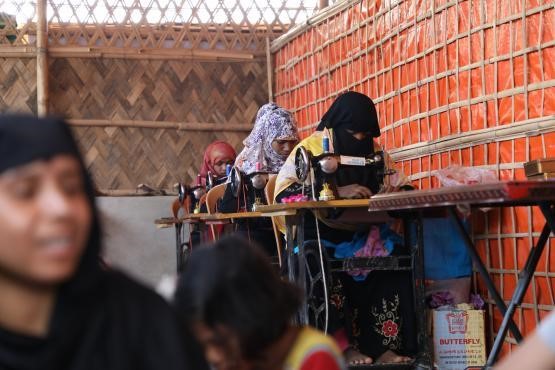

It was a hot summer afternoon at the Balukhali 2 Camp. I was talking to a few girls there. I wanted to know about their life in Rohingya camps in Cox’s Bazar.
And there she was.
Let’s say her name was Ruby. Now, Ruby was smiling shyly while the other girls were teasing her. Being curious, I wanted to know what the reason was. One of the girls said Ruby talks to her would-be husband all night long. And for that, she keeps four cell phones. The girl is only at her adolescence; 15 or 16 years old at best. I reminded Ruby of the proper age for a girl to get married. After all, she was still a child. To my happy surprise, Ruby smiled back and said, “I am not marrying now. I will be 18 before he will come to meet me.”
Early and child marriage remains high among the Rohingya refugees. A good percentage of the women who fled Myanmar on 25th August 2017 are young and adolescent girls. There is a tendency among the female-headed households to ‘marry off’ their daughters. The primary reason for these marriages is to have someone who can look after them. Poverty, the absence of father or male guardians and security issues put huge pressure on these families.
This huge influx is seen as the result of the discrimination against the Rohingya people. But that suffering was not equal for both men and women. Females suffered much worse compared to men in this man-made crisis. That reality led ActionAid Bangladesh (AAB) to take on a women-led, women-centered approach. Promoting women’s leadership in emergencies is part of the core signature of our Human Rights Based Approach (HRBA).
In October 2017, AAB started its operation in Kutupalong-Balukhali Expansion Site in Cox’s Bazar. So far AAB has established 7 culturally‐appropriate Women Safe Spaces (WSSs) and child-friendly corners as part of the WSSs.

These places are working as support hubs for the Rohingya women and girls. And these hubs are providing psycho‐social support and counselling, case management on gender-based violence and mitigation, health referrals, information on humanitarian services and life’s critical issues such as sexual and reproductive health, child marriage, GBV prevention and response.
The people at the camps are receiving life‐saving services like foods, shelter, WASH, solar lamps. AAB also designed the dignity kit. It’s a well-designed hygiene kit for women and girls to help them improve their mobility, safety and access to information.
The common scenario of refugee camps is countless faces of displaced people. They lack the basic needs and wait for relief, often engaging in fights when the relief is inadequate.
AAB engages community women in various activities such as volunteering, community mobilization, providing psycho‐social support to community women, meeting with local (e.g. camp coordination meetings) and international authorities (e.g. meeting with high profile foreign delegations) etc., where they can raise their voices without fear. These efforts ultimately support the cause of women empowerment and leadership.
As one of AAB’s recipients shared her experience of coming to the safe space. “We feel good when we come to Shantikhana (a peaceful place) [WSS]. We talk with other women, girls and I forget everything. We have received dignity kits, lights to go to the toilet at night. If I face any problem I come to here to talk to these sisters. I feel good here. Whenever I go back to my shelter, all the bad memories come back to me”.
AAB and other humanitarian actors have been trying to provide the best possible support to women and girls. Yet, there are some concerns that are on the rise. There are reports of domestic and intimate partner violence, sexual harassment and the fear of trafficking. Some women shared their vulnerability as the men abandoned their families and went on to marry other women. This newer crisis puts these abandoned women in a more fragile state.
When we talk about their hopes for the future, most of the women and girls say that they want to return to Myanmar. As 35 years old Ayesha Bibi tells us, “I would like to return to my country one day but with a written document which ensures my independence and rights. If we have to live in dire conditions in both the countries, I’d rather live in Bangladesh. It ensures the safety of my children’s lives at least. All I am doing now is thinking of how to ensure a brighter future for my children.”

After a year of endless effort by the organizations, challenges are still there. The cliché of the “long way to go” still exists. But the achievement is visible as well.
While a concept on a drawing board may sound promising, the practical application may fail. Even though many organizations came up with packages like dignity kits and WSSs, it is AAB’s achievement to use the WSS’s as a virtual dignity kit.
It is the well-managed solution that made the UNICEF delegate say- “other organisations should take ActionAid Bangladesh WSS design as a model”. It is the awareness and vision despite being a refugee girl that made Ruby say- “I will be 18 before he will come to meet me.”
Note: All names are Pseudonyms